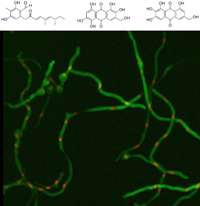Natural fungal products could offer potential Alzheimer's therapy

A team of researchers at the University of Kansas, including T. Chris Gamblin, associate professor of molecular biosciences, and Berl Oakley, Irving S. Johnson Distinguished Professor of Molecular Biology, has shown that some fungal natural products can inhibit buildup of tau—a protein linked to Alzheimer's disease and other neurodegenerative diseases.
"Tau is a protein that is produced by the body," said Gamblin. "It's found primarily in neurons in the normal brain where it helps them maintain their shape and function. In Alzheimer's disease, through a mechanism we don't quite understand, tau is changed in a way that causes it to start clumping together with other tau molecules, forming string-like fibrils that accumulate into the pathological structure in Alzheimer's disease called 'neurofibrillary tangles.'"
Along with Clay Wang of the University of Southern California, Gamblin tested 17 natural fungal products, most of which had similar structures to compounds seen by previous researchers to hinder tau formation.
"Because fungi have historically been a rich source of biologically useful compounds, we thought it would be worth screening them to determine their activity," said Gamblin. "We used advanced genetic techniques to get the fungus to overproduce many, many different types of natural products so we could purify and identify them."
Of the 17 natural products, the researchers discovered three that were effective in inhibiting tau accumulation: 2,ω-dihydroxyemodin, asperthecin and asperbenzaldehyde.
Their findings were published recently in Planta Medica, a leading international peer-reviewed journal in the field of medicinal plants and natural product research.
"All three of them did block the aggregation of tau 100 percent as far as we can tell," said Gamblin. "Some of them took very high concentrations to do so though."
To test the natural products in vitro, the researchers used a fatty acid to induce tau fibril formation by mixing the protein and fatty acid together either with or without a compound. Then they employed a filter trap assay "very similar to taking the material and pouring it over a sieve-like material or filter," according to Gamblin.
The filter trapped the large fibrils while individual proteins passed through the filter. Next, the investigators used electron microscopy—using a beam of electrons in place of light to a magnification in the hundreds of thousands—to visualize fibrils too small to be seen by conventional light microscopy.
"The biggest challenge for us was getting the filter trap to work reproducibly and consistently so we could be confident in our results," Gamblin said.
The KU researcher said that asperbenzaldehyde's ability to block tau formation was especially exciting, because no one before has identified a similarly structured molecule as a tau fibril inhibitor.
"Asperbenzaldehyde is also a precursor to a large class of molecules that help inhibit fatty acid oxidation," said Gamblin. "We can make the fatty acid oxidation inhibitors in two chemical steps using asperbenzaldehyde as the starting material, where it would take 16 steps if starting from scratch. It's interesting that people believe that inhibiting fatty acid oxidation in Alzheimer's patients may also have therapeutic benefit."
Gamblin said that there are two next steps to seeing if these natural compounds could become therapies for humans living with Alzheimer's disease and related disorders.
"The first would be to test the compounds on living cells or model organisms like fly or mouse models of Alzheimer's disease to see if they can prevent tau fibril formation in a cell or neuron," he said. "This is something we are currently working on. The second step would be to collaborate with a medicinal chemist to change the molecules in very specific ways to try to enhance their potency."












